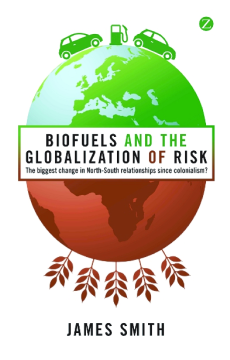
Additional Information
Book Details
Abstract
Biofuels and the Globalization of Risk offers a fresh, compelling analysis of the politics and policies behind the biofuels story, with its technological optimism and often-idealized promises for the future. This essential new critique argues that investment in biofuels may reconfigure risk and responsibility, whereby the global South is encouraged to invest its future in growing biofuel crops, often at the expense of food, in order that the global North may continue its unsustainable energy consumption unabated and guilt-free. Thus, Smith argues, biofuels may constitute the biggest change in North-South relationships since colonialism.
James Smith is co-director of and a senior lecturer in the Centre of African Studies at the University of Edinburgh. He is also a director at the ESRC Innogen Research Center at Edinburgh and a visiting fellow in development policy and practice at the Open University. He has worked with many international organizations and research centers including Oxfam, DFID, IDRC and the Consultative Group for International Agricultural Research.
'This is a revolutionary body of work that analyses the allure of biofuels from a global, historical and political perspective.'
Judi Wakhungu, African Centre of Technology Studies
'James Smith has produced an incredibly important book for anyone interested in why global investment in biofuels continues to expand at breakneck speed despite the technology’s current inherent inability to make any significant impact on energy security or green house gas emissions.'
Simon Trace, Practical Action
'I strongly recommend the reading of this book, for the expert and non-expert and politicians. If biofuels are to play an important role in our energy future, it is imperative we address all questions including uncomfortable ones, as Smith has done in this book.'
Frank Rosillio-Calle, Imperial College
Table of Contents
| Section Title | Page | Action | Price |
|---|---|---|---|
| About the author | i | ||
| Acknowledgements | vi | ||
| Acronyms | vii | ||
| ONE | Introduction: perfect storms | 1 | ||
| Biofuelled futures | 3 | ||
| Globalizing technology and risk | 7 | ||
| Global assemblages | 9 | ||
| Organization of the book | 13 | ||
| TWO | Science: biofuels, yesterday and tomorrow | 15 | ||
| Energy revolution redux | 15 | ||
| Biofuels – early history | 16 | ||
| Biofuels 101 | 17 | ||
| Brazil and bioethanol | 21 | ||
| Biofuels and the United States | 24 | ||
| Jatropha and India | 27 | ||
| Tanzania, land and biofuels | 30 | ||
| Later-generation biofuels | 34 | ||
| The black box of biorefineries | 36 | ||
| From the past to the future | 38 | ||
| THREE | Systems: complexity and knowledge | 41 | ||
| Capturing complexity | 41 | ||
| Setting boundaries | 42 | ||
| Life-cycle analyses | 43 | ||
| Dealing with uncertainties | 45 | ||
| ‘Energy return on investment’ | 46 | ||
| Flawed analyses | 48 | ||
| Emissions and land-use change | 50 | ||
| Opportunity costs: indirect land-use change | 53 | ||
| Limited data and flawed accounting | 54 | ||
| Complexities of certification | 56 | ||
| Connecting biofuels and food security | 58 | ||
| Limits to knowledge, unlimited implications? | 62 | ||
| FOUR | Synergy: networks and interests | 65 | ||
| Assembling biofuels | 65 | ||
| Energy and (over)development | 66 | ||
| Beyond oil | 68 | ||
| The sustained failure of agriculture | 69 | ||
| Actors, discourses and debates | 70 | ||
| Actors and networks | 72 | ||
| FIVE | Scale: solutions and risks | 97 | ||
| Global–local dialectics | 97 | ||
| Can biofuels be pro-poor? | 98 | ||
| Indonesia, Malaysia and oil palm planting | 102 | ||
| Malian small-scale solutions? | 105 | ||
| Kenya – striking a balance | 108 | ||
| Scale and perspective | 111 | ||
| The global reach of biofuels | 114 | ||
| SIX | Sustainability? The globalization of risk | 116 | ||
| Scale and scope | 116 | ||
| Causes and effects | 117 | ||
| Assembling biofuels | 121 | ||
| Science | 123 | ||
| Systems | 124 | ||
| Synergy | 125 | ||
| Scale | 127 | ||
| Sustainability? | 129 | ||
| The globalization of risk | 130 | ||
| Notes | 132 | ||
| Bibliography | 135 | ||
| Index | 145 |
